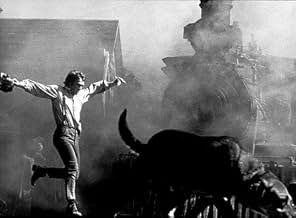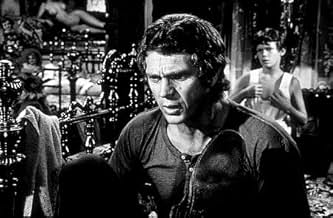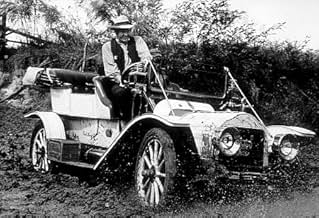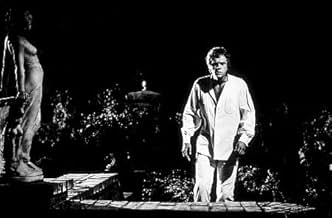CALIFICACIÓN DE IMDb
6.6/10
3.5 k
TU CALIFICACIÓN
Tres bribones buscavidas toman prestado el coche de su jefe en el Mississippi de 1905. Planean viajar hasta Memphis,pero lo que iba a se un inocente viaje se convierte en una gran aventura y... Leer todoTres bribones buscavidas toman prestado el coche de su jefe en el Mississippi de 1905. Planean viajar hasta Memphis,pero lo que iba a se un inocente viaje se convierte en una gran aventura y descubrimiento personal.Tres bribones buscavidas toman prestado el coche de su jefe en el Mississippi de 1905. Planean viajar hasta Memphis,pero lo que iba a se un inocente viaje se convierte en una gran aventura y descubrimiento personal.
- Dirección
- Guionistas
- Elenco
- Nominado a 2 premios Óscar
- 5 nominaciones en total
- Dirección
- Guionistas
- Todo el elenco y el equipo
- Producción, taquilla y más en IMDbPro
Opiniones destacadas
I saw this film when I was about the same age as the main character, the boy, played by Mitch Vogel. It left a strong impression on me. The cinematography, the magnificent score by John Williams, flawless acting, and, of course, Faulkner's story, create an atmosphere that few movies achieve. In terms of acting, McQueen is probably the weakest link, but he still deserves points for successfully suppressing his characteristic squint and open-mouthed grimace -- and he is as close to lovable as he can be. The movie also has more than it's share of memorable scenes, especially between Will Geer as the grandfather and Vogel.
I would be wary of letting young children see this film. The story conveys the undercurrents of racism and sexism that existed then (and now). I was 12 when I saw it and I understood it. As a parent, be ready to explain some things, though, and preview the film.
I would be wary of letting young children see this film. The story conveys the undercurrents of racism and sexism that existed then (and now). I was 12 when I saw it and I understood it. As a parent, be ready to explain some things, though, and preview the film.
This was a great film written by the famous writer William Faulkner dealing with an old man going back to his youth sixty years ago. Steve McQueen, (Boon Hogganbeck) along with a few of his friends decided to take a trip from Mississippi to Memphis in an old time car which was relatively new during this period of time and taking along a very young boy named Lucius, (Mitch Vogel). Boon takes Lucius into a brothel where he stays over night in Memphis and learns a great deal about the birds and the bees and especially from a sweet kind lady named Carrie, (Sharon Farrell) who is a gal very much in love with Boon. There is a horse race and lots of laughs and drama to go along with the rest of the picture. There was a great deal of problems between the director of this film Mark Rydell and Steve McQueen, but the film was finally completed but the producer would never direct another picture with McQueen.
Steve McQueen tools around in a classy car, dodging bad guys, loving the ladies, and not giving a cuss. This may read like your typical 1960s effort from him, but that's something "The Reivers" ain't.
What is it? I guess it can be summed up as a broad coming-of-age comedy set in the American South in 1905, featuring a boy named Lucius (Mitch Vogel) who, against his better judgment, sets off with a couple of older-but-not-wiser friends in his grandfather's stolen automobile to visit the wicked city of Memphis. In no time he is holed up in a local bordello, trying to help win back his grandfather's car in a desperate horse race.
At the center of Lucius's worries is the man who talked him into the whole adventure, Boon Hoggenbeck, who wants the car to impress one of the pretty Memphis prostitutes he has set his cap on. "He knows no obstacles, counts no costs, fears no dangers," Grandpa (Will Geer) warns young Lucius of Boon.
Okay, that does sound like McQueen the way Gramps put it there. But McQueen's Boon is more of an overgrown boy than stolid icon. A bucolic coming-of-age comedy based on a William Faulkner novel, "The Reivers" seems McQueen's attempt at stretching out from action-hero mode. He's quite a bit of fun with his sometimes outsized comic reactions, a bit old for the part but certainly a capable center in what amounts to his first ensemble piece since "The Great Escape."
Director Mark Rydell made life-affirming American-heartland flicks that celebrate homey characters and downhome values, and "The Reivers" certainly fits his oeuvre. He is abetted wonderfully by the sunny lenswork of Richard Moore and a graceful, jaunty score by John Williams. In its elegiac, serio-comic tone, it is a lot like the film McQueen chose to make this over, "Butch Cassidy And The Sundance Kid."
More a situation than a story, "The Reivers" introduces us to a shifting cast of characters and lets each spend some time with the viewer. Some leave stronger marks than others.
Rupert Crosse leaves the deepest impression as Lucius' distant black relative Ned, who drives Boon crazy asserting his rights as a member of the McCaslin family by virtue of a great-grandfather who impregnated a slave. Ned is a proud man who likes to push his point beyond the bounds of reason, stowing away on Grandfather's car when Boon and Lucius make their Memphis trip.
"If I wait until I'm invited I'll never will go anywhere," Ned points out when Boon tries unsuccessfully to toss him. Ned is the agent provocateur in "The Reivers," somewhat dangerous in his ways but valuable, too, played with a vulnerable, humor-filled grandeur by Crosse, who got an Oscar nomination for his work. You laugh more with him than at him, but it's a bit of both.
Where "The Reivers" goes a little wrong is with some of the other characters. Sharon Farrell is the proverbial prostitute with a heart of gold who bonds with Lucius, while other smaller parts are filled by memorable character actors who get little to do. "We were a pleasant and courteous people, tending to our business," Burgess Meredith explains in the voice-over narration, and often they seem a bit too much of just that. Even the bad guys, like a racist sheriff played by Clifton James, seem a bit toothless and too-easily- handled.
Still, I enjoyed this film, if more around the margins than in the main. It's not unusual to see McQueen wielding a pistol, but it is to watch the target josh him about his lousy aim between shots. Aided especially by Crosse and Vogel, "The Reivers" isn't maybe as wise or knowing as it tries to be, but does leave you with a warm and fuzzy feeling that doesn't stale with repeat viewings. A sleepy charmer, it shows even a king can make for a capable jester once in a while.
What is it? I guess it can be summed up as a broad coming-of-age comedy set in the American South in 1905, featuring a boy named Lucius (Mitch Vogel) who, against his better judgment, sets off with a couple of older-but-not-wiser friends in his grandfather's stolen automobile to visit the wicked city of Memphis. In no time he is holed up in a local bordello, trying to help win back his grandfather's car in a desperate horse race.
At the center of Lucius's worries is the man who talked him into the whole adventure, Boon Hoggenbeck, who wants the car to impress one of the pretty Memphis prostitutes he has set his cap on. "He knows no obstacles, counts no costs, fears no dangers," Grandpa (Will Geer) warns young Lucius of Boon.
Okay, that does sound like McQueen the way Gramps put it there. But McQueen's Boon is more of an overgrown boy than stolid icon. A bucolic coming-of-age comedy based on a William Faulkner novel, "The Reivers" seems McQueen's attempt at stretching out from action-hero mode. He's quite a bit of fun with his sometimes outsized comic reactions, a bit old for the part but certainly a capable center in what amounts to his first ensemble piece since "The Great Escape."
Director Mark Rydell made life-affirming American-heartland flicks that celebrate homey characters and downhome values, and "The Reivers" certainly fits his oeuvre. He is abetted wonderfully by the sunny lenswork of Richard Moore and a graceful, jaunty score by John Williams. In its elegiac, serio-comic tone, it is a lot like the film McQueen chose to make this over, "Butch Cassidy And The Sundance Kid."
More a situation than a story, "The Reivers" introduces us to a shifting cast of characters and lets each spend some time with the viewer. Some leave stronger marks than others.
Rupert Crosse leaves the deepest impression as Lucius' distant black relative Ned, who drives Boon crazy asserting his rights as a member of the McCaslin family by virtue of a great-grandfather who impregnated a slave. Ned is a proud man who likes to push his point beyond the bounds of reason, stowing away on Grandfather's car when Boon and Lucius make their Memphis trip.
"If I wait until I'm invited I'll never will go anywhere," Ned points out when Boon tries unsuccessfully to toss him. Ned is the agent provocateur in "The Reivers," somewhat dangerous in his ways but valuable, too, played with a vulnerable, humor-filled grandeur by Crosse, who got an Oscar nomination for his work. You laugh more with him than at him, but it's a bit of both.
Where "The Reivers" goes a little wrong is with some of the other characters. Sharon Farrell is the proverbial prostitute with a heart of gold who bonds with Lucius, while other smaller parts are filled by memorable character actors who get little to do. "We were a pleasant and courteous people, tending to our business," Burgess Meredith explains in the voice-over narration, and often they seem a bit too much of just that. Even the bad guys, like a racist sheriff played by Clifton James, seem a bit toothless and too-easily- handled.
Still, I enjoyed this film, if more around the margins than in the main. It's not unusual to see McQueen wielding a pistol, but it is to watch the target josh him about his lousy aim between shots. Aided especially by Crosse and Vogel, "The Reivers" isn't maybe as wise or knowing as it tries to be, but does leave you with a warm and fuzzy feeling that doesn't stale with repeat viewings. A sleepy charmer, it shows even a king can make for a capable jester once in a while.
For a movie that starred one of the greatest box office stars of his time, based on a Pulitzer Prize-winning novel by one America's greatest writers, "The Reivers" has continued to be something of an answer to a trivia question ("In what movie did Steve McQueen portray a semi-comic character involving a stolen automobile and a horse race?") I'm not sure of the reasons myself, but this movie has remained at the top of my "Favorite Movies" list since I first saw it in 1969. Maybe it was the out-of-character role of McQueen. Maybe it was the excellence of his supporting cast that includes Mitch Vogel, Rupert Crosse and Will Geer. Maybe it was the direction by Mark Rydell. Or maybe it was the outstanding score by John Williams (which has remained my favorite movie score of all time). Most likely, it is a combination of all the above. All I can say is that this movie has never lost its appeal for me. Watching the movie is like visiting an old friend with whom the passage of time will only strengthen the bonds of affection. This movie may not be for everybody, but I recommend it on the chance that you may be smitten by its special charm.
This turned out to be a very nice story, almost an old-fashioned type of film, based on an old William Faulkner novel.
The only difference between this an an earlier classic movie of this nature was a bit of profanity, but it was 1969 and that stuff was now allowed in films. However, there wasn't a lot of it and the characters are decent people, anything but profane. However, the main character, played by Steve McQueen, wasn't exactly the best role model, teaching his young son how to lie and then taking him to a "house of ill repute." Other than that, he's a good guy and the film does end on a high note as the young boy (played well by Mitch Vogel) learns a hard lesson about lying.
I haven't seen this film in awhile but I remember the wonderful yellow automobile in here. Wow, what a beautiful car. There is an interesting horse race in here, too, with a different twist to it.
In all, a nice movie with good messages in the last half hour after what looked like a film that was a shaky morally. There's some nice photography in here, too. This film is decent enough for one viewing but probably not to purchase for multiple screenings.
The only difference between this an an earlier classic movie of this nature was a bit of profanity, but it was 1969 and that stuff was now allowed in films. However, there wasn't a lot of it and the characters are decent people, anything but profane. However, the main character, played by Steve McQueen, wasn't exactly the best role model, teaching his young son how to lie and then taking him to a "house of ill repute." Other than that, he's a good guy and the film does end on a high note as the young boy (played well by Mitch Vogel) learns a hard lesson about lying.
I haven't seen this film in awhile but I remember the wonderful yellow automobile in here. Wow, what a beautiful car. There is an interesting horse race in here, too, with a different twist to it.
In all, a nice movie with good messages in the last half hour after what looked like a film that was a shaky morally. There's some nice photography in here, too. This film is decent enough for one viewing but probably not to purchase for multiple screenings.
¿Sabías que…?
- TriviaThe Winton Motor Carriage Company was a real automobile manufacturer, but they never produced a "Winton Flyer" model. The vehicle in the film was created from scratch by Kenneth Howard, aka Von Dutch, especially for this movie. The car was designed to resemble a typical vehicle from 1904, but built to withstand the rigors of filming. Steve McQueen called the car "the real star of the picture", and took possession of it after filming ended. It remained in his automobile collection until his death in 1980. It can be seen in the Petersen Automotive Museum in Los Angeles, CA.
- ErroresWhen Boon, Ned and Lucius begin their trip to Memphis in the Winton, the beginning of the scene is filmed in a traveling shot. As the journey proceeds, the camera truck's engine note can be heard in addition to the Winton's.
- Citas
Boon Hoggenbeck: Sometimes you have to say goodbye to the things you know and hello to the things you don't!
- Créditos curiososand introducing Mitch Vogel as Lucius
- ConexionesFeatured in Steve McQueen: Man on the Edge (1989)
Selecciones populares
Inicia sesión para calificar y agrega a la lista de videos para obtener recomendaciones personalizadas
- How long is The Reivers?Con tecnología de Alexa
Detalles
- Fecha de lanzamiento
- País de origen
- Idioma
- También se conoce como
- William Faulkner's The Reivers
- Locaciones de filmación
- Productoras
- Ver más créditos de la compañía en IMDbPro
Taquilla
- Presupuesto
- USD 5,000,000 (estimado)
- Tiempo de ejecución
- 1h 52min(112 min)
- Relación de aspecto
- 2.35 : 1
Contribuir a esta página
Sugiere una edición o agrega el contenido que falta























